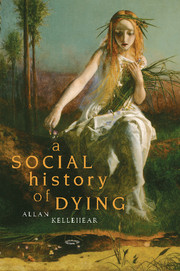Conclusion
Published online by Cambridge University Press: 22 September 2009
Summary
We can now see that the historical record of our dying behaviour has displayed two developments that have been steadily moving in opposite directions over the last two million years. The experience of dying has gradually become more private at the same time as its recognition has become more publicly controlled and defined.
Dying became more private in the following ways. Initially, dying as otherworld journey began as a whole community affair with the dying being signalled to everyone by the biological death of one of its members. With the arrival of settlements, dying began to focus around the deathbed surrounded by family and part of the community. This became the good death, a dying that was shared with that section of the community with which one had shared one's entire private and work life.
Urban developments saw the deathbed scene shared with more professionals and still less of the community. The well-managed dying became an increasingly private affair shared with small groups such as the historically evolved small family, a few work friends and a coterie of trusted professionals visiting the home or working at the local hospital. Still later, the Cosmopolitan Age saw dying even more privatised, so privatised in fact that the dying person might be the only one aware that he or she is dying. Dying as a shared social, that is, interpersonal affair is becoming endangered as a publicly recognised form of conduct.
- Type
- Chapter
- Information
- A Social History of Dying , pp. 251 - 256Publisher: Cambridge University PressPrint publication year: 2007



